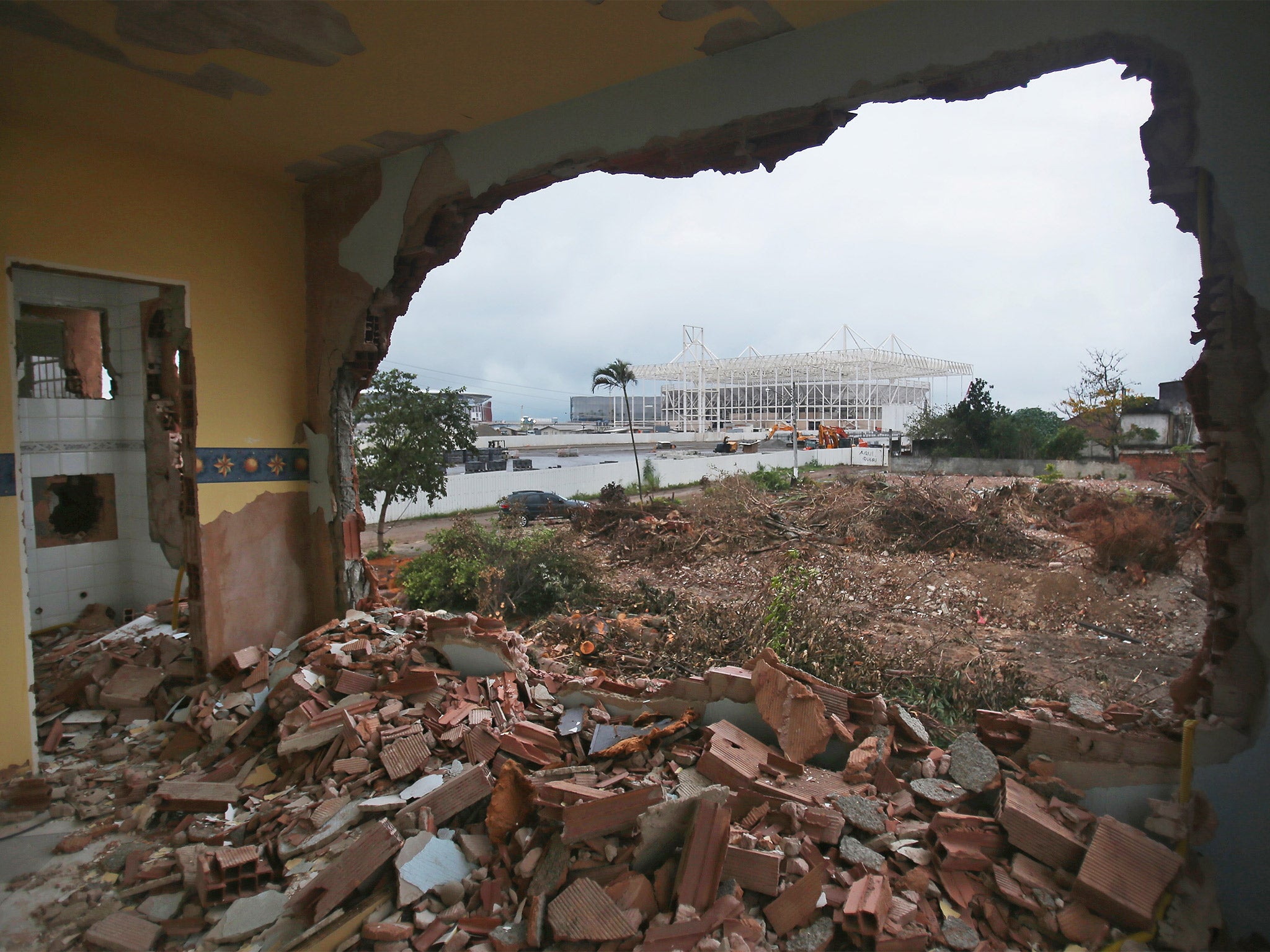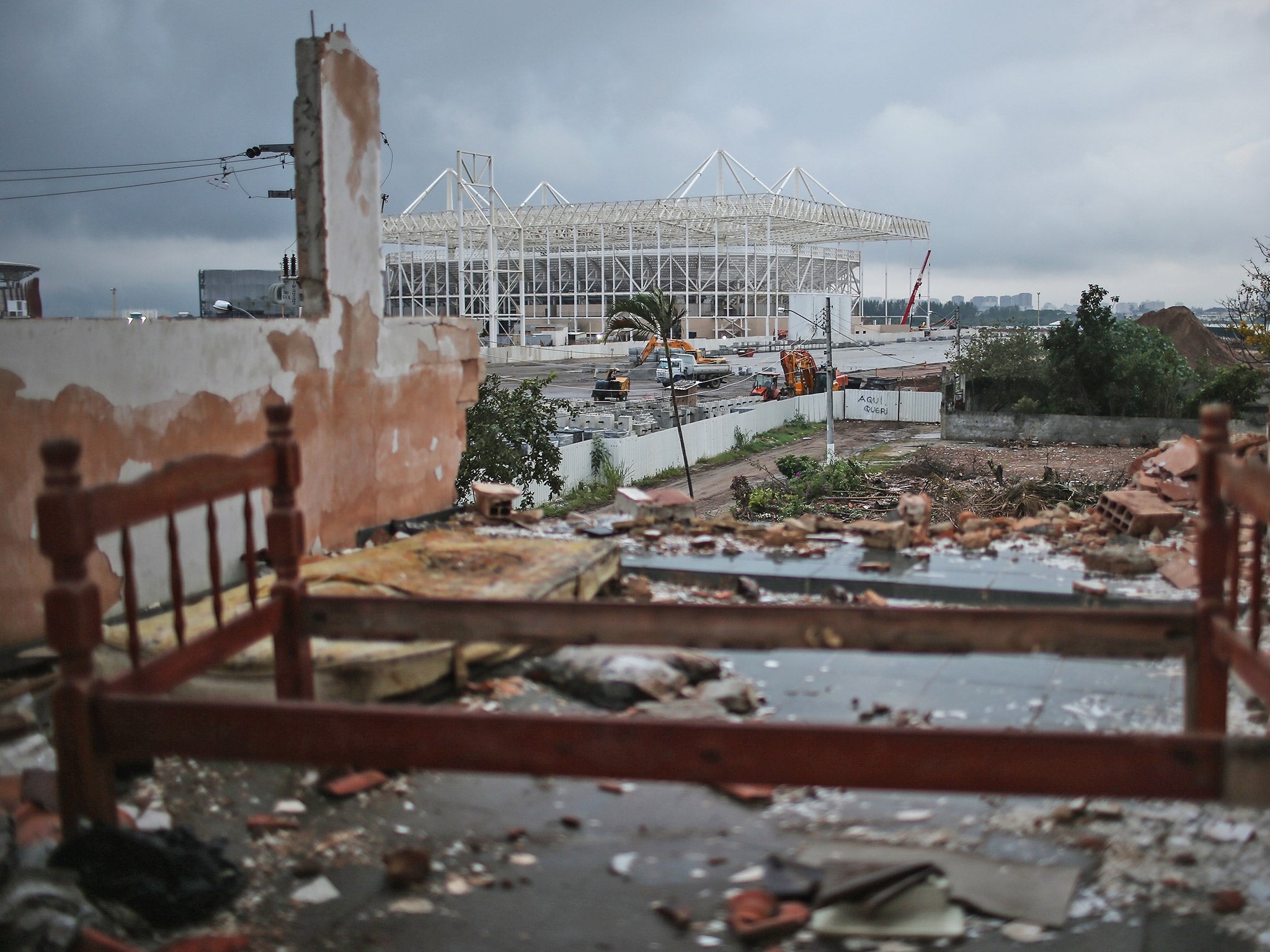Olympics 2016: The road to Rio gold paved with grinding poverty
A year from the start of the next Games in Brazil, the country seems to have learnt nothing from the experience of staging the World Cup. Ewan MacKenna visits the favelas where the cost of the get-rich-quick schemes is highest

Your support helps us to tell the story
This election is still a dead heat, according to most polls. In a fight with such wafer-thin margins, we need reporters on the ground talking to the people Trump and Harris are courting. Your support allows us to keep sending journalists to the story.
The Independent is trusted by 27 million Americans from across the entire political spectrum every month. Unlike many other quality news outlets, we choose not to lock you out of our reporting and analysis with paywalls. But quality journalism must still be paid for.
Help us keep bring these critical stories to light. Your support makes all the difference.
In the distance, Christ the Redeemer stares down from on high, but few folk here will ever get to view the statue in all its glory as the price of a tour ticket could feed a family for days. Just six miles across the city are the sparkling sands of Copacabana and Ipanema, but most people in this neighbourhood are unlikely to see the sea either as bus fares of around 60p are hugely prohibitive.
This is the Vasco da Gama favela, an area of just 15,000 or so souls but a microcosm of a hidden existence in much of Rio de Janeiro. Scattered all around are another 600 slums housing 1.3 million people in huts amid sewage and sorrow – that’s about 22 per cent of people in a city of divisions as incomprehensible as they are vulgar.
It is exactly a year to the start of the Rio Olympics but you would not dare ask those in Vasco about what the Games will mean to them. Instead, you hopscotch across odorous puddles in clay streets that somehow find a way to get narrower and darker. As the heat and smells intensify, the appearance of dwellings and those residing in them deteriorates. Then, at the peak of claustrophobia, there is a lung-relieving clearing but, while the Brazilian taxpayer is funding the construction of world-class arenas in better neighbourhoods at an underestimated cost of about £7.5bn, sport here revolves around a football pitch made of sand and dirt.
“But what you’re walking on are shallow graves,” a local says. “The drug dealers, they dug holes and buried a lot of bodies under the pitch.” With that, you look around and realise those same drug dealers are not overjoyed at your presence so you hustle away to safety.
This is the reality that will be lost amid the talk of qualifying times, stadium deadlines, water quality and hotel prices. Of course, every major sporting event covers farcically expensive trails by mumbling that vacuous buzzword “legacy”, but these Games will leave no legacy for the favelas. Brazil has not learnt its lesson from a World Cup chalked down elsewhere as a success when it failed to improve a ramshackle nation.

There are areas where these Olympics will make a difference, but predictably they are places like Barra da Tijuca. Once the roadworks are finished, it will be a 30-minute drive south-west from Rio. An affluent area of gated communities and luxury apartments, it is one of the four hubs these Olympics will take place in, hosting about half the events, but more than any of the others it brings to mind the words of former Brazilian International Olympic Committee member Alberto Murray.
“Everything that is being built in Rio is being used as an excuse for real estate development,” he tellingly complained. “Many feel the Olympics are being held not for the good of sport and of the citizens but for the interest of real estate speculation.”
In Tijuca, climbing from the ground slowly are the tennis and aquatics venues while the HSBC Arena to host gymnastics has stood proudly since before the city was awarded the Games. It may look like there’s a lot to do, but that’s just the Brazilian way. The country leaves its homework until late Sunday night.
Come next August, athletes and visitors will be greeted by a host that will be ready. Even issues as serious as the sailing venue of Guanabara Bay, where week the World Health Organisation asked the IOC to analyse virus levels owing to dirt and sewage, will probably be clean if not glistening. Cast your mind back to the hysteria over World Cup readiness and how that worked out for Fifa and fans.
The athletes’ village and the golf course are also in Tijuca, and organising committees will say both are entirely funded by businessmen. But that masks the deals that were done and the wealth that has been transferred from public to private hands.
The sign outside the village tells you the construction is being done by Odebrecht, the giant firm involved in the kickback scandal: it is still being paid extra for its World Cup work despite stadiums now being used for everything from mass-wedding centres to car parks.
Inside the Olympic village, the 17-storey high-rises will contain 3,600 apartments that will be sold on after the Games under the telling moniker of “Pure Island”. They will start at around £500,000 when the average annual income in Vasco is closer to £500.
The golf course, too, has private money funding it, with that cash coming from the billionaire property magnate Pasquale Mauro. A 2008 investigation by the ministry of labour found him to have 70 workers in slave-like conditions on one of his estates. His ownership of the land the course is being built on is disputed but, in return for funding the project, the developer he works in partnership with has been given permission to build 23 condominiums at 22 storeys each, where before the limit was six.
Similar condominiums he has built in the area have starting prices of around £1.75m. Thus he is expected to add millions more to his stockpile and all this was done without an environmental assessment because mayor Eduardo Paes gave direct permission. It so happens that Mauro’s developing partners donated 75 per cent of the money to the last mayoral electoral campaign.
In February, Joaquim Monteiro de Carvalho, President of the Municipal Olympic Committee, said: “I can say the golf course is one of our good stories... I don’t know this guy’s background, but while it’s private investment, it’s not a charity... I can tell you about the golf course we are building, I don’t know him, I don’t know these stories... Slaves? Strange. Otherwise he would be in the jail.”
You would expect this to have the nation in a rage, but Brazil’s size means much of the country is not bothered a local issue in a place where there are more pressing protest issues: Next up on the calendar is 16 August, when many are expected on the streets to voice their anger against President Dilma Rousseff with the country in recession, inflation at an uncomfortable level and massive corruption issues bubbling to the surface along with figures that put even the Olympic cost into context.
A handful did protest this year against the golf course debacle but a video emerged of one of them being punched in the face by police.
There are initiatives that will bring benefits after the Games. De Carvalho will say that the four hubs will help 2.5 million people in terms of infrastructure, mobility and investment, but most of these are the sector of Rio society that can already help themselves. He will mention the handball arena that will be deconstructed after the Games and turned into four schools and, while worthy, it is nice rather than effective.
Yet when it comes to Brazil, it is easy to quote cold statistics. It is a country with 10 per cent illiteracy, where reports hint that 13 million are underfed, where the murder rate is 21.8 per 100,000 (it is one per 100,000 in Britain), and where in many of Rio’s impoverished favelas over 15 per cent of children under four live in areas where there is sewage running openly outdoors. But some parts are home to the most expensive land in the southern hemisphere
Doing the same thing over and over and expecting different results is described as insanity, but here it is just called cruelty.
Join our commenting forum
Join thought-provoking conversations, follow other Independent readers and see their replies
Comments